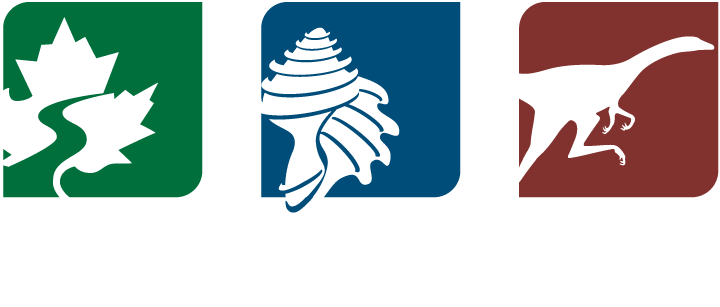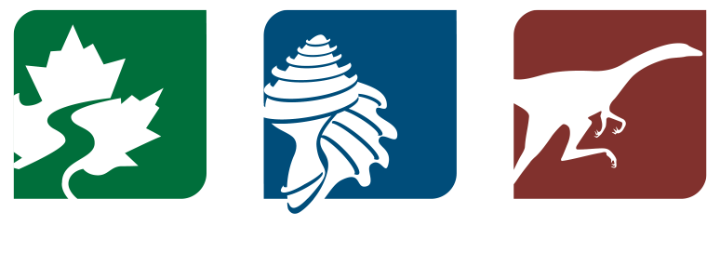Looking to the Future
Progress
For several centuries, women have contributed to the science of paleontology despite the constraints and hostility of their times. Pioneering women paved the way by navigating social expectations and restrictions. Their progress was scaffolded by mentorship and community building among women scientists. Conditions for women and other diverse groups in science today are better in many ways than they once were. We can look to the women in this exhibit to understand how paleontology has changed and to consider how to develop new paths for progress today and tomorrow.
Discovery
The universal rush of discovery still draws us to study ancient life. Imagine, like Mary Anning, walking below the imposing cliffs of the Jurassic Coast, carefully picking your way over stones filled with the spiraling shells of ammonites.
Imagine stumbling upon the remains of a plesiosaur: an ungainly, long-necked, paddle-legged creature that died millions of years ago. Imagine realizing you had discovered the first complete skeleton of an animal no one had ever seen. How thrilling would that have been? How incredible is it to know there are still so many discoveries to be found?
What advice would you give to a girl or young woman who wants to be a paleontologist?
Riley Black
“There’s no one path to becoming a paleontologist. There are so many different organisms to study, time periods to explore, and forms of expertise to develop. Curators or professors may be the most visible, but their work wouldn’t be possible without the tireless work of volunteers, collections managers, preparation experts, and others. There are paleontologists who do all their work in a lab and others who work for construction companies, checking construction sites to rescue fossils that might be destroyed. Paleontology is not a set list of jobs, but a constantly changing set of ideas and practices that need your imagination as much as your resolve. If someone tells you there’s no place for you in the field, don’t believe them. You can make your own place.”
Karen Chin
Take lots of science courses! Biology and geology are particularly relevant to the study of paleontology, but it is also important to have a firm foundation in math, chemistry, and physics.
Phoebe Cohen
“Aside from the obvious things like ‘work hard! Take lots of science classes!’ I would say – find mentors. Those can be science teachers, museum volunteers, or avocational paleontologists – find people who share your interests and can help you explore them. Once you’ve reached college, getting research experience is really critical – so finding a school that provides undergraduate research opportunities in the Earth sciences or evolutionary biology. And finally, there might be people who don’t believe in you – remember that it’s not up to them to define you and your success, only you can do that!”
Bushra Muzaffar Hussaini
“I encourage young women to pursue their dreams of becoming a paleontologist. There are lots of opportunities these days for them to pursue their interest as Paleo interns in the National Park Service for instance, or at the United States Geological Survey. Internships are also offered in Paleontology departments in museums and in NSF’s Research Experiences for Undergraduate programs, plus stipends and scholarships are offered by GSA and the Cushman Foundation for microfossil research. Finally, the Paleontological Society is a great resource for young paleontologists to network, meet mentors and learn about options/opportunities available to them in the field of paleontology.”
Rowan Lockwood
I think the biggest piece of advice would be to get out there and get involved! Visit museums, track down local fossil sites, check out internships, and learn more. Don’t be afraid to reach out to professional paleontologists to ask for advice or learn about opportunities.
Mimi Katz
“Work hard, build networks with your mentors, peers, and mentees, and above all – have fun!”
Patricia Kelley
“Don’t let anyone tell you that you can’t do something just because you are a girl (or whatever other reason they give you). Read all you can about fossils. Get your family to take you to museums or places where you can collect fossils. Ask questions. And get in touch with paleontologists like me as you grow up, so we can answer your questions or point you in the direction where you can find the answers yourself.”
Marina Suarez
“One piece of advice I would give would be to keep an open mind. I never thought I’d be a geochemist, but being a geochemist has given me the opportunity to be fairly versatile in the kinds of jobs I can get. So, I’d suggest to future paleontologists to diversify their toolbox of abilities.”
Lisa White
“Take a variety of science classes in school. Paleontology crosses many disciplines of science: biology, geology, ecology, chemistry and more. Research the sub-disciplines of paleontology to determine a focus when making college choices and reach out to individual scientists, museums, and institutions to find out more about the subjects that interest you.”
Women in Paleontology Panel Discussions
Science in the Virtual Pub (March 2021)
This panel with women paleontologists was held before the opening of the Daring to Dig exhibit as a Science in the Virtual Pub event on March 25, 2021. Panelists include:
Phoebe Cohen (Associate Professor, Williams College)
Patricia “Tricia” Kelley (Professor Emerita, University of North Carolina Wilmington)
Francisca Oboh-Ikuenobe (Professor and Associate Dean, Missouri University of Science and Technology)
Carlie Pietsch (Assistant Professor, San Jose State University)
Lisa White (Director of Education and Outreach, University of California Museum of Paleontology)
Yurena Yanes (Assistant Professor, University of Cincinnati).
Read more about Phoebe, Tricia, Francisca, Carlie, and Lisa on their profile pages.
WSKG (October 2021)
This panel with women paleontologists was held on October 26, 2021, and hosted by WSKG. The moderator was Nancy Coddington, Director of Science at WSKG Public Media. Panelists include:
Phoebe Cohen (Associate Professor, Williams College)
Elizabeth “Liz” Hermsen (Research Scientist, Paleontological Research Institution)
Linda Ivany (Professor and Associate Chair, Syracuse University)
Christy Visaggi (Senior Lecturer and Undergraduate Program Director, Geosciences, Georgia State University)
Donors & Contributors
This exhibit was developed by:
Elizabeth Hermsen, Phoebe Cohen, Alexandra Moore, Helaina Blume, Kate Rowell, Jonathan Hendricks, Robert Ross, and Don Haas.
We want to thank the following donors:
Individuals: Sandy Carlson, William DiMichele, Sandy Epstein, Rodney Feldmann, Susan Fleming, Robert Gastaldo, Carole Hickman, Claudia Johnson, Patricia Kelley, Mary Kosloski, Ann Molineux, Corinne Myers, Emily Butler Sessa, Constance Soja, and Emily Vokes
Institutions: Association of Science and Technology Centers - IF/THEN Gender Equity Project, BorgWarner Morse Systems, Community Foundation of Tompkins County, Geological Society of America, Institute of Museum and Library Services, National Endowment for the Humanities, and Paleontological Society.
We also thank the following contributors:
Lisa Amati, Leon Apgar, Nan Arens, Riley Black, Diana Boyer, Nancy Budd, Matthew Carrano, Karen Chin, Nancy Coddington, Sharon Cooper, Claire Derry, Eleanor Derry, Louis Derry, Gregory Dietl, Dave Fass, Allie Francies, Dana Friend, Alejandra Gandolfo, Abbie Gepner, Brian Gollands, Linda Van Aller Hernick, Bushra Muzaffar Hussaini, Linda Ivany, Mimi Katz, Patricia Kelley, Tasnuva Ming Khan, Kathryn Leacock, Reba Leahy, Jere Lipps, Rowan Lockwood, Skyler Maasen, Alana McGillis, Ed Mooney, Keith Moore, Alexandra Moore, Corinne Myers, Susan Newell, Francisca Oboh-Ikuenobe, Jeffrey Over, Sasha Paris, Carlie Pietsch, Vanessa Rhue, Maya Rogers, Kate Rowell, Robyn & Steve Schmitt, Amanda Schmitt Piha, Caren Shin, Leslie Skibiniski, Judy Smith, Nancy Stamm, Phil Stokes, Elizabeth Stricker, Marina Suarez, John Tegan, Hannah Teush, David Tewkesbury, Hugh Torrens, Laurie VanVleet, Christy Visaggi, Emily Vokes, Vicky Wang, Emily Weaver, Mac West, and Lisa White.












